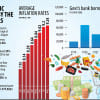FY25 budget should focus on the right priorities

The national budget of FY2024-25 is set to be announced at a time when Bangladesh's economy is going through a difficult phase, facing high inflation and declining foreign exchange reserves. These challenges have partially been attributed to the falling value of the taka against the US dollar and a declining trend in remittance earnings and modest export inflows. While analysing the challenges of the upcoming budget, there are certain long-standing issues that need to be addressed—namely sluggish private investment, increased debt burden, dismal revenue mobilisation, inefficient implementation of development projects, lack of effective governance in the financial sector, etc. Resource allocation of the budget must also address the fundamental issues of reducing poverty particularly in the face of high inflation, managing rising inequality, sustaining growth, and generating employment. Though Bangladesh's budget structure is shaped on the basis of medium-term budgetary framework (MTBF), a certain degree of adjustment based on the short-term priorities are feasible too.
The most important task for the upcoming budget is to determine the priorities and manage resource allocations accordingly. The top priority must be bringing the inflation rate down to a tolerable level, instead of focusing on accelerating growth or ambitious and costly large-scale investment programmes. In April this year, the point-to-point inflation rate was as high as 9.74 percent, which put not only the low-income but also the middle-income people under serious pressure. Besides, though it is not within the direct purview of the budget, restoring macroeconomic stability through careful planning and strategising is of paramount importance. As for the forex reserves, since the hike in August 2021, we observe a steady decline with the gross reserves, which stood at $18.61 billion on May 21, 2024. In recent months, the gap between the supply and demand of dollars in the current account has widened along with the decline in the financial account balance, putting an upward pressure on the price of the greenback. While the artificially retained exchange rate was at Tk 110 till May 8, the market rate exceeded Tk 116, causing a faster depletion of forex reserves. Finally, very recently, the Bangladesh Bank set the crawling peg mid-rate (CPMR) at Tk 117 per US dollar, up from Tk 110.
Against this backdrop, the revenue and expenditure strategies should be aligned with the priorities. To contain the unprecedentedly high inflation, necessary downward adjustments of VAT, regulatory duties, import taxes, etc could give some relief to ordinary people. A one-percentage-point cut in the source tax on incomes from the supply of essential food commodities, as expected to be proposed by the government, is a right step. In order to compensate the deficit in revenue for this tax cut as well as to broaden the fiscal space, a massive reform is needed, gradually shifting the focus towards direct taxation.
As part of tax reform initiatives, digitalisation at every level of monetary transactions and making the revenue collection mechanism fully automated is essential. In addition, decentralising the tax system and tax offices, arranging tax fairs at different localities with certain incentives, severe penalty in case of corruption or harassment of clients, making submission of tax return certificates mandatory, making the surcharges more progressive, redesigning income tax brackets, making excise duties more progressive, etc can have important implications. Redesigning wealth tax in a progressive manner should be seriously considered too. Given the rising trend in income inequality, such reforms in direct taxation should be implemented with even greater emphasis.
In order to provide some comfort to the low-income groups, a massive shift is needed in favour of safety net allocations. The open market sale (OMS) activity should be expanded significantly by increasing the number of OMS trucks, including more items on the list, and subsidising those items by a greater margin. Besides, initiatives like rationing and fair price shops need to be introduced and operated. Revisiting the beneficiary selection criterion is also needed to correctly identify the vulnerable people. Though the government is planning to increase the number of beneficiaries along with the per capita allocation of several safety net programmes, given the high inflation rate, a multi-fold increase is needed to the allocation.
The government can also incentivise the private sector through small tax rebates to safeguard the interests of existing workers through monthly ration, subsidised mid-meal, etc. Besides, the safety net programmes need to be revisited while focusing on the urban poor living in slum areas. While analysing the safety net budgets, we should however keep in mind that it includes allocations for pension earners as well as interest payments of savings certificates. It is therefore crucial to track the amount of safety net allocations of these payments, which are actually directed towards those at the grassroots level. To combat the rising inflation, policy directions for effective market monitoring should be outlined in the budget. Initiatives for a quick implementation of the National Social Security Strategy (NSSS) should also be considered.
While considering the priorities for the next budget, though the target of macroeconomic stability is not a directly related fiscal target, important changes can be made through carefully designed strategies. For example, in order to encourage dollar inflow, there is a 2.5 percent incentive for remitters. Though this step has increased the inflow of remittances in the short term, as long as there is any divergence between the official and the unofficial rates, remitters will have monetary incentive to send remittances through the informal channels. Therefore, it is important to consider non-monetary incentives for the remitters, and in the long run, it is crucial to eventually move towards a market-driven unified exchange rate regime. However, in this regard, it is crucial to have effective background management of the relevant institutions.
Another reason for the increased flow through informal channels is the existence of the informal hundi market, based on black money. To channel foreign currency through formal means, strict measures should be taken to constrain the syphoning of black money through informal channels. To boost trade-related taxation as well as to put a constraint on the outflow of foreign currency, luxury commodities need to be taxed at even higher rates.
Allocations in different expenditure heads must be done in a careful manner while curtailing lesser important expenses and prioritising expenditure for social infrastructure, e.g. education, healthcare and social safety net. Despite low revenue mobilisation, these expenditure heads should not be compromised. With the twin macro concerns of the government, e.g. forex reserve depletion coupled with the falling value of the taka, the central bank has taken different contractionary policy stances to tame down inflation. As a result, the pace of job creation has slowed down. Consequently, the upcoming budget must prioritise incentivising the micro, small and cottage industry through tax rebates, subsidies of different forms, etc for small-scale job creation.
Due to the forex crisis, careful consideration is also needed in case of any large-scale investment, and the priority should be to concentrate on quick completion of the ongoing ones. Given the narrow fiscal space, it should also be kept in mind that larger deficits and associated domestic financing can fuel inflation, whereas costly foreign financing can have further negative implications on the overall macro scenario. A more balanced approach in case of deficit financing while focusing more on long-term multilateral financing sources instead of costly bank financing is a better approach at this stage.
Finally, although the national budget is a tool for resource allocation and management, it is also expected that, given the prevailing challenges in certain important institutions, the upcoming budget will offer specific policy directions to tackle such underlying challenges of the economy, especially those related to low revenue mobilisation and irregularities in the financial sector.
Dr Sayema Haque Bidisha is professor at the Department of Economics of the University of Dhaka. She is also a research director at the South Asian Network on Economic Modeling (SANEM).
Views expressed in this article are the author's own.
Follow The Daily Star Opinion on Facebook for the latest opinions, commentaries and analyses by experts and professionals. To contribute your article or letter to The Daily Star Opinion, see our guidelines for submission.


 For all latest news, follow The Daily Star's Google News channel.
For all latest news, follow The Daily Star's Google News channel. 











Comments